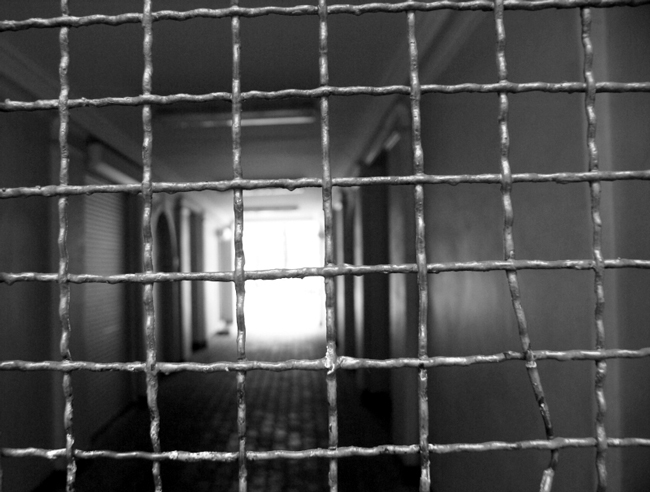
As state legislators have tried and failed to craft a juvenile-sentencing law that conforms to landmark U.S. Supreme Court rulings, a national advocacy group is calling Florida a “clear outlier” among states for its hard-line approach to trying juveniles as adults.
The Washington-based Campaign for Youth Justice, which opposes incarcerating youths under 18 as adults, says Florida transfers more teens to adult criminal court than any other state.
“These tough-on-crime laws are ineffective at keeping kids from re-offending,” said the group’s policy director, Carmen Daugherty. “Florida needs to take additional steps to reform its juvenile justice system.”
Daugherty said youths who are incarcerated in the adult criminal-justice system are 34 percent more likely to commit other crimes after release.
But while the advocacy group praised Florida Department of Juvenile Justice Secretary Wansley Walters, who has championed diversion programs for youth offenders, Walters took issue with their charge that the state is out of step. She said Florida “is not an outlier.”
“We’re chipping away,” Walters said. “We’ve seen almost a quarter-reduction in arrests. We’re seeing fewer and fewer kids get direct-filed (as adults), fewer and fewer kids getting sent away, fewer and fewer kids landing in the deep end (of the juvenile justice system).”
According to DJJ figures, Florida’s commitment of low- and moderate-risk youth has decreased by 62 percent during Walters’ two-and-a-half-year tenure at the agency.
The group’s report comes as lawmakers prepare to take up juvenile sentencing proposals during the spring legislative session — including the use of risk-assessment tools and diversion programs to keep all but the worst offenders out of the deep end of the juvenile justice system, where the likelihood of recidivism is greatest.
Lawmakers also are gearing up for yet another try at sentencing juveniles under recent U.S. Supreme Court rulings that restrict the use of life sentences.
Three years ago, in Graham v. Florida, the high court banned life sentences for juveniles convicted of non-homicide crimes. And last year, in Miller v. Alabama, the high court found that juveniles convicted of murder can still face life sentences, but the judges must weigh criteria such as the offenders’ maturity and the nature of the crimes before imposing that sentence.
Since the Graham decision in 2010, the Legislature has taken up bills that would have allowed life sentences for juveniles with the possibility of release if they show signs of rehabilitation. So far, none has passed.
And given the vacuum, the justices of the Florida Supreme Court last month suggested that they could impose a review system for juvenile sentences, when they heard cases involving 70-year and 90-year terms.
“The legislators in all the states like to point their fingers at the judiciary and say they’re being proactive,” said state Rep. Dave Kerner, D-Lake Worth, who has both law enforcement and prosecutorial experience. “But how can we blame them if we’re not willing to step up to the plate and pass a bill and have it signed into law?”
“We of the Legislature have a duty to provide clarity to the courts,” said state Sen. Rob Bradley, a Fleming Island Republican and former prosecutor. “I understand why the Florida Supreme Court is discussing how to deal with this issue in the recent cases that they heard. I understand their frustration, and I look forward to participating with my colleagues this session in providing some clear guidance to the courts going forward.”
Bradley, whose 2013 proposal (SB 1350) died on the last day of session, said he hasn’t decided whether to try again next year.
Both he and Kerner make a sharp distinction between juveniles convicted of homicide and non-homicide crimes.
“My main concern continues to be whenever you have a murder victim, that that family not be required to relive that heinous act by having to come back and have hearings after hearings in the future, once the trial has resolved and the murderer is sentenced,” Bradley said.
He added that he’s more flexible in the cases of defendants who did not commit murder.
In the House, Kerner said, “Everybody seems to be at the table.”
He said he’s told House Criminal Justice Chairman Matt Gaetz, R-Fort Walton Beach, and Vice Chairman Ray Pilon, R-Sarasota, that a bipartisan solution to juvenile sentencing is one of his top priorities.
“No one wants to be soft on crime,” Kerner said. “But we also don’t want to miss out on an opportunity to have meaningful participation and meaningful rehabilitation of the juveniles in our society who have done wrong. And we need to craft a bill that finds that balance.”
–Margie Menzel, News Service of Florida




























m&m says
Don’t these stats point to the problem of parenting and the lack of. More relaxed laws will only add to the problem which is teenage criminals.. The laws should be tougher and keep more of them behind bars.. They probably learn more in jail then they do at home..
Sherry Epley says
Many, many of the people in prison have committed crimes because they are mentally ill and actually critically need treatment. . . not just punishment. This from the treatment advocacy center:
“(a) Using 2004–2005 data not previously published, we found that in the United States
there are now more than three times more seriously mentally ill persons in jails and
prisons than in hospitals. Looked at by individual states, in North Dakota there are
approximately an equal number of mentally ill persons in jails and prisons compared to
hospitals. By contrast, Arizona and Nevada have almost ten times more mentally ill
persons in jails and prisons than in hospitals. It is thus fact, not hyperbole, that
America’s jails and prisons have become our new mental hospitals.
(b) Recent studies suggest that at least 16 percent of inmates in jails and prisons have a
serious mental illness. In 1983 a similar study reported that the percentage was
6.4 percent. Thus, in less than three decades, the percentage of seriously mentally ill
prisoners has almost tripled.
(c) These findings are consistent with studies reporting that 40 percent of individuals with
serious mental illnesses have been in jail or prison at some time in their lives.
(d) It is now extremely difficult to find a bed for a seriously mentally ill person who needs
to be hospitalized. In 1955 there was one psychiatric bed for every 300 Americans. In
2005 there was one psychiatric bed for every 3,000 Americans. Even worse, the
majority of the existing beds were filled with court-ordered (forensic) cases and thus
not really available.
(e) In historical perspective, we have returned to the early nineteenth century, when
mentally ill persons filled our jails and prisons. At that time, a reform movement,
sparked by Dorothea Dix, led to a more humane treatment of mentally ill persons. For
over a hundred years, mentally ill individuals were treated in hospitals. We have now
returned to the conditions of the 1840s by putting large numbers of mentally ill persons
back into jails and prisons.”
JL says
I’m sick of peole getting out of prison because they claim mental illness. I have worked for attorneys most of my adult life. If they truly are mentally ill, they can petition the court, if the Judge feels there is enough evidence, they will be examined by a psychiatrist. If they are deemed mentally unfit, they will not be placed in a regular jail. There are many in jail who claim they’re mentally ill, just like all claim they’re innocent. I’ve seen many walk in the doors where I have worked claiming they aren’t guilty, they’re mentally ill. And they were in NO way mentally ill. They were guilty of a crime and didn’t want to do the time. I wish we had more prisons and that people were made to do their full time the Judge gives them. We’d have a lot less crime. But you should not get off with a crime just because you are mentally ill. Particularly if you kill someone.
Most of the juveniles who are in jail are there because they don’t care about laws or discipline and usually come from families who don’t care either.
I hope Florida keeps everything just the way it is. We need tougher laws, not more leniency.
Sherry Epley says
What a cruel idea that we should essentially, a great tax payer expense, imprison and punish all those who “act out” in a criminal way because they were innocently born into an unhealthy environment. Flatly denying that any criminals need mental treatment is insanity itself. We should all be learning and forming opinions based on actual facts. . .This from The Bureau of Justice Statistics:
“STUDY FINDS MORE THAN HALF OF ALL PRISON AND JAIL INMATES HAVE MENTAL HEALTH PROBLEMS
WASHINGTON—More than half of all prison and jail inmates, including 56 percent of state prisoners, 45 percent of federal prisoners and 64 percent of local jail inmates, were found to have a mental health problem, according to a new study published today by the Justice Department’s Bureau of Justice Statistics (BJS).
The findings represent inmates’ reporting symptoms rather than an official diagnosis of a mental illness. The study determined the presence of mental health problems among prison and jail inmates by asking them about a recent history or symptoms of mental disorders that occurred in the last year.
Among the inmates who reported symptoms of a mental disorder:
54 percent of local jail inmates had symptoms of mania, 30 percent major depression and 24 percent psychotic disorder, such as delusions or hallucinations.
43 percent of state prisoners had symptoms of mania, 23 percent major depression and 15 percent psychotic disorder.
35 percent of federal prisoners had symptoms of mania, 16 percent major depression and 10 percent psychotic disorder.
Female inmates had higher rates of mental health problems than male inmates—in state prisons, 73 percent of females and 55 percent of males; in federal prisons, 61 percent of females and 44 percent of males; and in local jails, 75 percent of females and 63 percent of males.”
Nancy N. says
Learn more? Learn WHAT? How to fight? How to commit more crimes? Have you seen the inside of the hell holes that pass for juvenile detention facilities? They are run by gangs. Kids have to become hardened criminals and fight for their very survival in those places.
More kids are developing substance abuse issues and falling through the cracks of mental health care into the criminal justice system. Instead of putting them into juvenile detention where their lives are guaranteed to be ruined with no hope of recovery, we should be looking at ways of redeeming them and turning them into productive citizens.